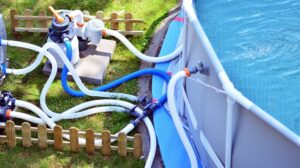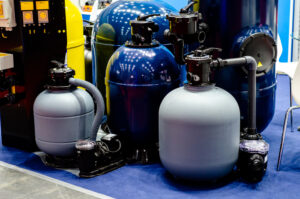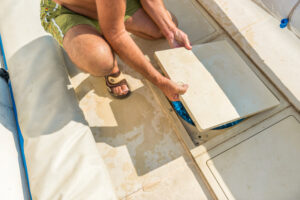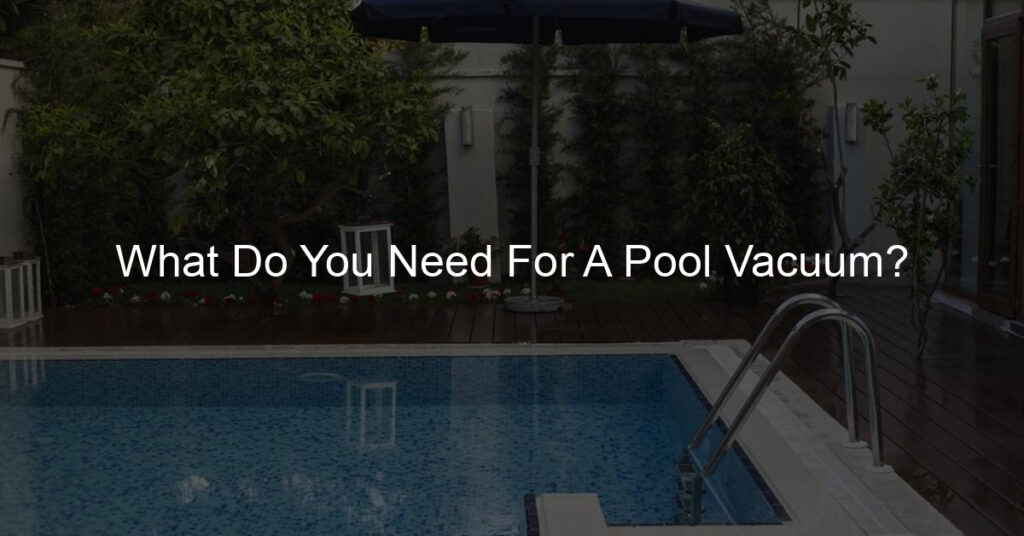Introduction
If you’ve been pondering everything that goes into owning and maintaining a pool vacuum, you’re in the right place. We’re about to dive into all the details you need to know, from understanding the basics of what a pool vacuum is and how it works to choosing the right components and dealing with common issues.
Whether you’re new to pool maintenance or looking to upgrade your current equipment, this guide will provide you with the valuable information you’re seeking.
Understanding the Basics of a Pool Vacuum: What It Is and How It Works
At its most fundamental level, a pool vacuum operates much like your household vacuum cleaner, but is specially designed to handle water and collect debris from your swimming pool.
Using the suction power generated by your pool’s pump system, it travels along the bottom and sides of your pool, collecting everything from small particles of dust to larger leaves. Depending on the model, this debris may be collected in an attached bag or directed to your pool’s filtration system.
Essential Parts of a Pool Vacuum: A Comprehensive Guide
A pool vacuum isn’t just a single piece of equipment. It’s a combination of various components working together. This includes the vacuum head, which physically collects the debris; the hose, which transports this debris; and the telescopic pole, which allows you to maneuver the vacuum around the pool.
Each of these parts is crucial for the vacuum to function properly, and understanding their individual roles can make your pool cleaning tasks far more effective.
The Role of a Pool Vacuum Hose: Features and Functions
The hose of a pool vacuum isn’t just a simple tube. It plays a pivotal role in ensuring the efficiency of your vacuuming process. It connects the vacuum head to the skimmer box, facilitating the transfer of water and debris from the pool to the filter system or collection bag.
A good hose should be durable, long enough to reach every part of your pool, and able to withstand the chemical environment of pool water.

Types of Pool Vacuum Heads: Which One Do You Need?
There are several types of pool vacuum heads available, each with their own benefits. Weighted vacuum heads, for example, are excellent for concrete or tiled pools as they firmly stick to the pool floor for thorough cleaning.
On the other hand, wheeled vacuum heads are ideal for vinyl-lined pools to prevent any damage. It’s crucial to select a head suitable for your pool’s construction and the kind of debris it frequently accumulates.
Choosing the Right Pool Vacuum Pole: Key Factors to Consider
A pool vacuum pole, also known as a telescopic pole, is a necessary part of your vacuum setup. The pole lets you guide the vacuum head around your pool and reach all corners without having to get in the water.
Look for a durable, adjustable pole that can reach the farthest parts of your pool, is light enough to handle comfortably, and is resistant to rust or corrosion from the pool chemicals.
Why You Need Pool Vacuum Brushes: Importance and Selection
Brushes are an integral part of a pool vacuum, helping to dislodge stubborn algae and grime from the pool surfaces. These bristles can be made from various materials, such as nylon for delicate surfaces, or stainless steel for tougher cleaning. The right brush can make a significant difference in maintaining a clean and healthy pool.
The Significance of Pool Vacuum Filters: Types and Maintenance
Your pool vacuum filter plays a significant role in trapping and removing debris from your pool water. There are different types of filters, including sand, cartridge, and diatomaceous earth (DE), each with unique properties and maintenance requirements. Regular cleaning of your filter is essential to ensure the efficiency of your pool vacuum and overall pool cleanliness.

Pool Vacuum Adapter: Understanding Its Role and Installation
The pool vacuum adapter is a small but essential component of your pool vacuum setup. It acts as the connector between the skimmer box and the vacuum hose, enabling you to switch from normal filtration to vacuuming mode. Proper installation is key, as a poorly fitted adapter can lead to loss of suction and inefficient cleaning.
| Types of Vacuum Heads | Ideal for | Benefits | Considerations |
|---|---|---|---|
| Weighted Heads | Concrete or Tiled Pools | Ensures thorough cleaning by sticking to the pool floor | Can be too heavy for some users |
| Wheeled Heads | Vinyl-lined Pools | Prevents damage to the pool liner | May not clean as effectively as weighted heads |
Maintenance Tips for Your Pool Vacuum: Ensuring Longevity
Just like any other appliance, your pool vacuum needs regular maintenance to ensure its longevity. This includes cleaning the vacuum head and hose after each use, inspecting for any damage, and storing it in a dry, shaded area to prevent exposure to harsh weather conditions. Also, remember to regularly check and clean your pool vacuum filter to ensure optimal performance.
Best Practices for Storing Your Pool Vacuum: Tips and Tricks
Proper storage of your pool vacuum is just as important as using it correctly. Store it in a cool, dry place away from direct sunlight, as UV rays can damage the materials. Always rinse the vacuum with fresh water after use to remove any residual pool chemicals, and allow it to dry thoroughly before storing to prevent mildew growth.
Troubleshooting Common Pool Vacuum Issues: Expert Advice
Like any piece of equipment, pool vacuums may sometimes encounter problems. Common issues include loss of suction, blockages in the hose, or difficulty moving around the pool. Each of these problems has its own set of potential solutions, such as checking for leaks, clearing blockages, or adjusting the weight and buoyancy of the vacuum head.

Upgrading Your Pool Vacuum: When and Why It’s Necessary
After years of service, you may find your pool vacuum isn’t performing as well as it used to, or maybe your pool’s needs have changed. Upgrading to a new model can provide more efficient cleaning, easier handling, or additional features. It’s worth considering factors such as the size and shape of your pool, the type of debris you commonly deal with, and any budget constraints you have.
Selecting the Right Pool Vacuum for Your Pool Type: In-Ground vs Above Ground
Not all pool vacuums are designed to work in all types of pools. Above-ground pools often have softer walls and may require vacuums with gentler suction, while in-ground pools can accommodate more robust models. It’s vital to choose a vacuum designed for your specific pool type to ensure effective cleaning without causing damage.
The Role of a Pool Skimmer in Conjunction with a Pool Vacuum
While a pool vacuum does the heavy lifting, the pool skimmer is also an essential part of keeping your pool clean. The skimmer catches larger debris like leaves and insects on the water’s surface before they sink and become harder to remove. Using a skimmer and vacuum in tandem provides a comprehensive cleaning solution for your pool.
Budgeting for a Pool Vacuum: Average Costs and Saving Tips
The cost of a pool vacuum can vary widely depending on its type and features. Manual vacuums are generally the least expensive option, while robotic models can cost significantly more due to their advanced features. However, investing in a high-quality vacuum can save you money in the long run by reducing the need for professional pool cleaning services.
Eco-Friendly Pool Vacuums: What You Need to Know
As webecome more conscious of our environmental impact, it’s worth considering eco-friendly options for your pool maintenance. Solar-powered or energy-efficient pool vacuums can help reduce your energy consumption, while models with reusable filter bags cut down on waste. They might be more expensive upfront, but they can help save both the environment and your utility bills in the long run.
Exploring Advanced Features of Modern Pool Vacuums: Robotic and Automatic Options
Modern pool vacuums come with advanced features that make pool cleaning easier and more efficient. Robotic pool vacuums, for instance, can navigate your pool independently and can even scrub your pool walls.
Automatic vacuums connect to your pool’s circulation system and clean without any intervention. These advanced options can save you time and effort, although they may come with a higher price tag.
Pool Vacuum Safety Precautions: Ensuring a Safe Cleaning Experience
Safety should always be your first priority when using a pool vacuum. Never use the vacuum while people are swimming, and always unplug electric or robotic vacuums before removing them from the pool.
Ensure all cables and hoses are safely out of the way to prevent tripping hazards and store the vacuum safely when not in use to prevent any accidental damage or injury.
Understanding Pool Vacuum Energy Consumption: Efficiency Tips
Pool vacuums, especially automatic or robotic ones, can consume a fair amount of energy. To minimize your energy consumption, consider running your pool vacuum during off-peak hours if your electricity rates vary throughout the day. Also, regular maintenance of your vacuum can ensure it operates efficiently, using less energy to clean your pool.
How Seasonal Changes Impact Pool Vacuum Usage: A Year-Round Guide
The change of seasons can affect your pool vacuum usage. In fall, you may need to vacuum more frequently due to falling leaves, while in winter, many people cover their pools and use the vacuum less. Understanding how these changes impact your pool can help you adapt your maintenance routine accordingly and ensure your pool stays clean and inviting all year round.
Conclusion
Maintaining a clean and healthy swimming pool involves many factors, and a pool vacuum is an indispensable tool in this process. Understanding the various components and how they work together, as well as knowing how to choose, maintain, and troubleshoot your equipment, will make your pool maintenance tasks easier and more effective.
With the knowledge you’ve gained from this guide, you’re now well-equipped to make the most of your pool vacuum and enjoy a pristine swimming pool.
Diving Deeper: Unexplored Aspects
Impact of Pool Size and Shape on Your Vacuum Choice
Your pool’s size and shape can significantly influence your choice of pool vacuum. Larger pools may benefit from automatic or robotic vacuums that can cover a lot of ground without manual intervention, while smaller or unusually shaped pools might require a manual vacuum for more precise control.
The Use of Pool Vacuum for Hot Tubs and Spas
While this guide focuses primarily on swimming pools, it’s worth noting that pool vacuums can also be used to clean hot tubs and spas. Smaller, handheld models are typically best for these smaller bodies of water.
Pool Vacuums and Water Conservation
Proper use of a pool vacuum can also contribute to water conservation. By keeping your pool water clean, you reduce the need for draining and refilling, thus saving a significant amount of water over time.
Using a Pool Vacuum in Combination with Other Cleaning Methods
While a pool vacuum is a powerful cleaning tool, it’s most effective when used in combination with other methods, such as brushing, skimming, and regular water testing. This holistic approach to pool maintenance will help ensure a clean, healthy swimming environment.














